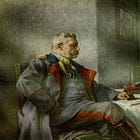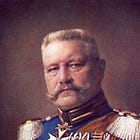This post is part of a long series. To read the parts that precede it, and those that follow, please follow the links on the following page.
Field Marshal Count Moltke, Count Schlieffen, and the World War
Georg Wetzell
(Continued)
There is no argument that the progress made in the field of technique 'permits the military commander to be ever present in an entirely different sense of the word that in the days of Moltke' (Foerster). However, aside from the uncertainty of the hostile situation, does that eliminate disagreements and misconceptions among the friendly commanders, lack of information about the enemy and so on, in short, all those things which Moltke says are unpredictable? The World War answers this very definitely; the answer being: No.
These obstacles are all the less eliminated, the more 'the military commander remains far in the rear, brooding over the map at his desk in a warm room,' and the less he makes it a point to discuss the situation personally with his co-responsible subordinate commanders (this personal discussion may be conducted also by telephone). Foerster writes: 'The Marne campaign of 1914 gives us an illustration of two modern military commanders, one of whom managed to overcome his mistakes, while the other failed to do so.' The former is Joffre, the latter Moltke II [the Younger.]
And why was this so? Because the German general stayed far behind the front at his desk; whereas the French general, by his personal intervention and appearance among his subordinate commanders, gradually instilled in them again confidence in the ultimate victory. The battle of the Marne, like the battle of the Frontiers, was lost because the German Commander-in-Chief followed the mirage of the 'desk general' with his technical aids and remained in Coblenz and Luxembourg, instead of making his appearance on that part of the front where the main effort of the entire operations was being made.
For instance, in the battle of Marne, he should have joined the armies of the right flank of September 1. Thus he could have saved the armies on the decisive right flank their unnecessary maneuvers; and the crisis of the Marne would never have materialized. In this sense, Field Marshal von der Goltz very aptly writes as early as 1901: 'Of two equally capable generals, the more active one will remain the winner.'
As regards the Marne campaign, the early developments of this operation even goes to show that General von Moltke was a greater strategist than Joffre. The 'how' of the more active general may follow various and entirely distinct roads. It is impossible for the commander to appear everywhere in person and to take a hand in the action.
Field Marshal Count Moltke’s method of sending out liaison officers from his staff to supervise the execution of his directives was rarely put into practice in the early stages of the World War, despite the availability of aviation and 60-miles-an-hour automobiles. When Joffre found it impossible, late in the autumn of 1914, to visit all parts of the front — politicians were unduly occupying his time, he took recourse to the expedient of sending the energetic [Ferdinand] Foch to any point where he wished to make sure that his own decisions were carried out. Foch later used [Maxime] Weygand, his Chief of Staff, in a similar manner.
I am further of the opinion that, despite its apparent logic, the illustration of 'the modern military commander' is not true as Foerster draws the picture with the words: 'The principal work of the commander-in-chief is accomplished as soon as the forces are engaged in battle, in the sense which Moltke upholds s the ideal.' That would mean, up to the moment of the great clash of arms; it would mean further that 'although he does not completely withdraw from the conduct of the operations itself, his subsequent efforts will be small in comparison with his previous function as bearer of the central will. The essence of his will is and remains the battle, but the main part of his activities precedes the battle.'
Neither Moltke’s conduct of the Wars of 1866 and 1870-1871, nor the form of high command which prevailed on all sides during the World War confirms these conclusions. On the contrary, it is my view that, even in modern conduct of war, the essential feature of generalship is not the 'planning prior to the outbreak of war, but that it truly begins with the 'acting' in the period of concentration and finds its crowning glory in the battle in which the commander-in-chief of necessity must take a hand. Thus we see that the modern high command still resembles that of Napoleon and the great Moltke. The action, and not the plan, is the deciding factor.
It is not until the period of concentration that the various elements of reconnaissance (tanks, cavalry, aviation, radio, political and military intelligence) and contact with the enemy cast some light on the hostile situation. While many assumptions will be conformed, many things will be different than expected. Many intentions will be practicable; others will be impracticable.
'The reality of war,' writes Ludendorff, the foremost German teacher of the World War, 'demands not the execution of prepared plans, but the appreciation of the weak points of the enemy and their exploitation in the destruction of the opponent.'
Freytag-Loringhoven reports about Napoleon: 'He invariably acted in conformity with the circumstances. He would not hesitate to drop a plan as soon as an opportunity presented itself to gain his objectives more speedily and effectively by some other means. Without fail, he would adapt his carefully prepared actions to the changes in the situation.'
Precisely the same holds true of the high command of Moltke, in 1866 and 1870. It was the experience gathered in those wars which caused him to make the statement: 'Strategy is a system of expedients.' Strategy cannot adjust itself exclusively to 'plans,' but must concentrate far more closely on 'action.' That was the case also in the World War.
To be continued …








The principal work of the commander-in-chief is accomplished as soon as the forces are engaged in battle, in the sense which Moltke upholds s the ideal.' That would mean, up to the moment of the great clash of arms;
I think it interesting that Gen Wetzell missed the point that Foerster made about Moltke - that once the plan has been made and the execution of that plan has begun, then it all becomes a matter of expedients and adaptability to the situation - in essence, the spirit and intent of "no plan survives first contact" Frankly, Foerster got it right. It was an era of technical innovation and that the principles of war remained the same but would be applied differently to adapt to the new science and technical innovations.